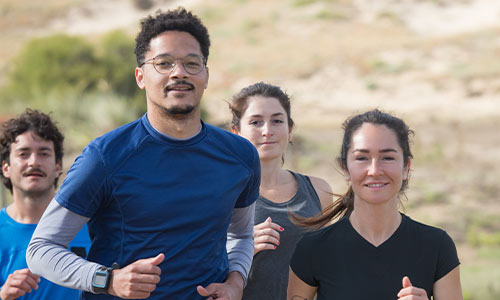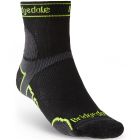Redefining Strength: Embracing Real Bodies and Honest Fitness Journeys
In a world filled with unrealistic body standards and one-size-fits-all definitions of fitness, many individuals, especially women, struggle with feelings of inadequacy and self-doubt. The constant pressure to conform to a specific image of "fit" or "in shape" can leave us exhausted and questioning our worth. It's time to challenge these toxic ideals and embrace a more inclusive and honest approach to fitness and body image.
The Journey of an Athlete:
Many of us who have a passion for fitness, like running, often find ourselves comparing our bodies to those who epitomise the traditional "athletic" look. We feel out of place, as if we don't belong in an industry event or social media feeds that showcase a limited range of body types. This journey of an athlete isn't about conforming; it's about breaking free from these stereotypes and embracing our unique strengths and experiences.

Honesty over Perfection:
Social media often presents us with a highlight reel of people's lives, showcasing their successes but concealing the struggles they face. This constant comparison can lead to feelings of inadequacy and the belief that giving up is the only option when the going gets tough. To build a healthier perspective, we must shift our focus towards embracing both successes and setbacks, acknowledging that vulnerability is a powerful source of empowerment.
The Liberating Power of Running:
Running can be a transformative experience, teaching us that strength is not confined to a specific body type. For some of us, athleticism didn't come naturally but running showed us that our bodies are capable of incredible achievements. Embracing the journey, even the raw and ugly parts, is what makes us stronger and more empowered individuals.
Challenging Toxic Fitness Culture:
The fitness industry must address the issue of size inclusivity. It's disheartening that certain running brands still do not offer clothing that caters to all body sizes and shapes. This exclusionary approach only perpetuates the idea that certain body types are not worthy of representation. As consumers, we can demand change by supporting brands that celebrate diversity and inclusivity.

Shifting the Focus from Appearance to Health:
The glorification of diet culture and the promotion of restrictive eating habits must be challenged. True health is about adopting a lifestyle that prioritises well-being, both physically and mentally. It's about nourishing our bodies with balanced nutrition and embracing our bodies' unique features, including love handles, cellulite, and stretch marks. Real strength is not a physical image; it's a feeling that comes from within.
Embracing Vulnerability:
By sharing struggles alongside successes, we create a more authentic and empowering narrative. It's through vulnerability that we inspire others and redefine the idea of strength. Liberating ourselves from the pursuit of perfection and embracing our real selves allows us to stand proudly and challenge the conventional definitions of "fit" and "in shape."
Reclaiming Our Strength:
Our true strength lies in the pursuit of health, happiness, and authenticity. It's not about striving for a perfect body; it's about recognizing that strength is a multifaceted concept that extends beyond physical appearance. It's acknowledging that our journey is unique, and our worth is not defined by unrealistic ideals.
Conclusion:
Embracing real bodies and honest fitness journeys is the key to breaking free from the shackles of toxic fitness culture. By prioritising health, embracing vulnerability, and supporting size inclusivity, we can create a more empowering fitness community where every individual feels proud of their achievements. It's time to stand boldly in front of the mirror, own our strength, and rewrite the narrative of what "fit" truly looks like.
-
 Bridgedale Mens Trail Run Light T2 Merino Sport Socks£13.85 to £14.16RRP £18.00 Save Up To £4.15
Bridgedale Mens Trail Run Light T2 Merino Sport Socks£13.85 to £14.16RRP £18.00 Save Up To £4.15
Categories
- Sport (28)
- Product Reviews (3)
- Team Outdoor Look (7)
- Mike Wild (2)
- Mike Payton (2)
- Suse Hammond-Pears (3)
- Snowboarding (12)
- Latest Offers (105)
- Shop Talk (1)
- Competitions (7)
- Walking (413)
- Lifestyle Fashion (8)
- Travel (86)
- Kit Guides (176)
- Workwear Clothing (6)
- Safety Workwear (4)
- Health/Fitness (289)
- Skiing (91)
- Great Outdoors (1316)
- Cycling (92)
- January 2025
- December 2024
- November 2024
- October 2024
- September 2024
- August 2024
- July 2024
- June 2024
- May 2024
- April 2024
- March 2024
- February 2024
- January 2024
- December 2023
- November 2023
- October 2023
- September 2023
- August 2023
- July 2023
- June 2023
- May 2023
- April 2023
- March 2023
- February 2023
- January 2023
- December 2022
- November 2022
- October 2022
- September 2022
- August 2022
- July 2022
- June 2022
- May 2022
- April 2022
- March 2022
- February 2022
- January 2022
- December 2021
- November 2021
- October 2021
- September 2021
- August 2021
- July 2021
- June 2021
- May 2021
- April 2021
- March 2021
- February 2021
- January 2021
- December 2020
- November 2020
- October 2020
- September 2020
- August 2020
- July 2020
- June 2020
- May 2020
- April 2020
- March 2020
- February 2020
- January 2020
- December 2019
- November 2019
- October 2019
- September 2019
- August 2019
- July 2019
- June 2019
- May 2019
- April 2019
- March 2019
- February 2019
- January 2019
- December 2018
- November 2018
- October 2018
- September 2018
- August 2018
- July 2018
- June 2018
- May 2018
- April 2018
- March 2018
- February 2018
- January 2018
- December 2017
- November 2017
- October 2017
- September 2017
- August 2017
- July 2017
- June 2017
- May 2017
- April 2017
- March 2017
- February 2017
- January 2017
- December 2016
- November 2016
- October 2016
- September 2016
- August 2016
- July 2016
- June 2016
- May 2016
- April 2016
- March 2016
- February 2016
- January 2016
- December 2015
- November 2015
- October 2015
- September 2015
- August 2015
- July 2015
- June 2015
- May 2015
- April 2015
- March 2015
- February 2015
- January 2015
- December 2014
- November 2014
- October 2014
- September 2014
- August 2014
- July 2014
- June 2014
- May 2014
- April 2014
- March 2014
- February 2014
- January 2014
- December 2013
- November 2013
- October 2013
- September 2013
- August 2013
- July 2013
- June 2013
- May 2013
- April 2013
- March 2013
- February 2013
- January 2013
- December 2012
- November 2012
- October 2012
- September 2012
- August 2012
- July 2012
- June 2012
- May 2012
- April 2012
- March 2012
- February 2012
- January 2012
- December 2011
- November 2011
- October 2011
- September 2011
- August 2011
- May 2010
- April 2010
- March 2010
- February 2010
- January 2010
- November 2009
- October 2009
- September 2009


Submit a Comment